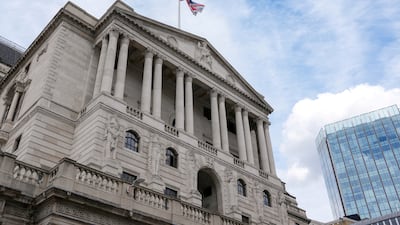The Bank of England left interest rates unchanged at 5.25 per cent, bringing to an end a cycle of 14 straight increases in the cost of borrowing.
The Monetary Policy Committee had been widely expected to raise rates for the 15th successive time but market sentiment shifted when data showed a surprise fall in the rate of inflation on Wednesday.
In the event the MPC voted five to four in favour of putting interest rates on hold. Four members of the MPC voted to raise rates to 5.5 per cent.
It is the first time the Bank of England has taken a break from increasing rates since November 2021.
The Consumer Price Index fell to 6.7 per cent in August, following a reading of 6.8 per cent in July, and is now at its lowest point since February last year.
"Inflation has fallen a lot in recent months and we think it will continue to do so. That's welcome news," Bank of England governor Andrew Bailey said. "But there is no room for complacency. We need to be sure inflation returns to normal and we will continue to take the decisions necessary to do just that."
In a letter to the UK government he listed some of the factors that guided the policymakers decision. Food price inflation appears to have peaked, core consumer goods increases started to fall back and external cost pressures have eased.
There are however dangers to consider as well. According to Mr Bailey services inflation is projected to remain elevated, weekly earnings growth is running at an above inflation 8.1 per cent and oil prices are on an upwards trajectory.
He said that monetary policy will need to be sufficiently restrictive to hit the 2 per cent headline inflation target while noting the potential threat from "second-round effects of external cost shocks on inflation in wages and domestic prices".
"Borrowers and mortgage holders will breathe a sigh of relief, but the Bank of England still has some difficult decisions ahead," Russ Mould, investment director at AJ Bell, told The National.
"The economy isn’t really growing and purchasing managers' indices may warn of a slowdown ahead, while increases in the oil price, rising rents and a fresh slide in sterling (which increases the cost of imports) could all fuel inflation if they are sustained."
Split decision
The Bank of England now predicts that the UK economy will grow by only 0.1 per cent in the third quarter of this year, compared with a forecast of 0.4 per cent growth at its last meeting.
It also expects inflation to return to its target of 2 per cent by the second quarter of 2025.

“The split decision from the Monetary Policy Committee – with five in favour of a rate pause and four favouring a quarter-point hike – proves how tricky the decision was for the Bank of England, following the better-than-expected inflation data on Wednesday," said Alice Haine, personal finance analyst at Bestinvest.
The MPC's decision comes a day after the US Federal Reserve held interest rates steady, but noted that another rise is likely this year and that there would be fewer cuts than previously expected in 2024.
Sweden's Riksbank and Norway's Norges Bank each raised their key interest rates by 0.25 percentage points on Thursday, but the Swiss National Bank unexpectedly left its rate unchanged.
"In many ways, the Bank of England has delivered the same story as the Federal Reserve yesterday, and puts both central banks at odds with what is happening in Europe, where the European Central Bank and a number of European central banks have continued to raise interest rates further this month," Stuart Cole, chief macro economist at Equiti Capital told The National.
UK inflation peaked at 11.1 per cent in October last year, and the government has repeatedly pledged to reduce it to about 5 per cent by the end of the year.
Prime Minister Rishi Sunak said that the plan to bring inflation down was working.
"In the meantime we have got support in place to help families that are struggling, whether it is those on welfare or those with mortgages," he said.
"The most important thing I can do to help people is to bring inflation down as quickly as possible. Yesterday's figures show that the plan is working."
For Janet Mui, wealth manager at RBC Brewin Dolphin, pausing the upwards march of interest rates shows that the Bank of England is a little concerned that the effect of the 14 previous increases is now starting to bite into the economy, "particularly as an increasing number of households refinance into significantly higher rates".
"The other factor is that the latest data from the UK jobs market has weakened and the trend is expected to continue into 2024," she added.
Meanwhile, the pound fell about 0.9 per cent against the dollar to $1.2239 in the wake of the decision, its lowest level in six months.
The markets were evenly split on the chances of an interest rate rise this month, and are now 80 per cent convinced that there is one more increase left in this cycle.
"The Bank of England thinks they have done enough," said Mark Nash, head of fixed income alternatives at Jupiter Asset Management. "But they are taking a risk with inflation as the pound is falling."


